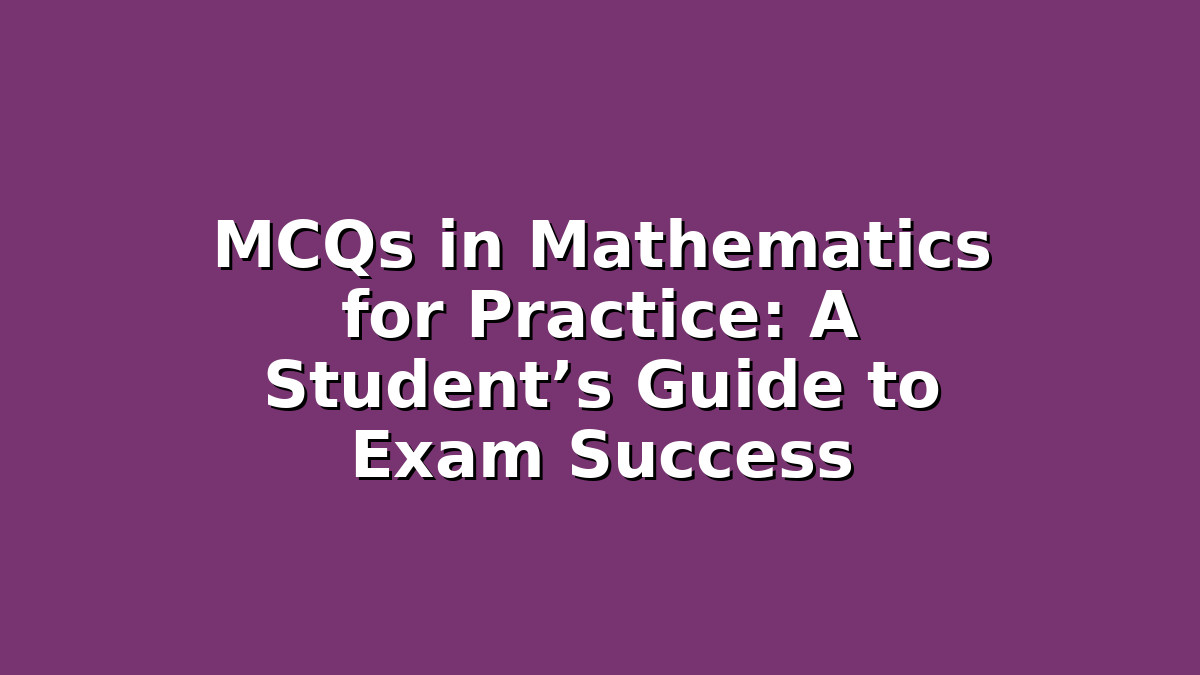Mathematics is often seen as one of the most challenging subjects for students across all educational levels. Whether you’re preparing for school exams, competitive tests, or standardized assessments, mastering math concepts requires consistent practice and smart study strategies. One of the most effective ways to reinforce your understanding and improve problem-solving speed is through practicing Multiple Choice Questions (MCQs). This article will explore why MCQs are essential for math preparation, provide practical tips on how to use them effectively, and suggest strategies to maximize your exam performance.
Why Practice MCQs in Mathematics?
Multiple Choice Questions have become a popular testing format because they assess a wide range of skills, from conceptual understanding to quick recall and application. For students, practicing MCQs in math has several benefits:
– Exposure to Diverse Topics: MCQs often cover a broad spectrum of math topics, allowing you to review many concepts within a limited time.
– Time Management: Since each question has a fixed answer set and typically requires quick thinking, practicing MCQs helps you develop speed and accuracy.
– Identifying Weak Areas: When you practice MCQs, you can quickly identify topics where you make mistakes, helping you to focus your study time more effectively.
– Exam Familiarity: Many exams use MCQ formats, so regular practice can reduce anxiety and improve confidence on test day.
Section 1: How to Integrate MCQ Practice into Your Study Routine
To get the most out of MCQ practice, it’s important to incorporate it systematically into your study plan. Here are some tips:
1. Start with Topic-Wise MCQs
Begin by practicing MCQs by specific topics such as algebra, geometry, trigonometry, or calculus. This focused approach allows you to strengthen your understanding of each concept individually. Many textbooks and online platforms provide topic-wise question banks, which can be a great resource.
2. Set a Schedule for MCQ Practice
Dedicate a fixed time daily or weekly solely for practicing MCQs. For example, 30 to 45 minutes of focused MCQ practice after reviewing concepts can reinforce learning effectively. Consistency is key, so make it a non-negotiable part of your study routine.
3. Simulate Exam Conditions Occasionally
To build stamina and improve time management, attempt full-length MCQ tests under timed conditions. This practice prepares you mentally for the pressure of exam day and helps you develop pacing strategies.
Section 2: Strategies to Solve Math MCQs Efficiently
Beyond regular practice, employing smart strategies can significantly improve your performance in solving MCQs.
1. Read Questions Carefully
Math MCQs often contain tricky wordings or subtle details. Take time to read each question carefully, underline key data, and understand what is being asked before attempting to solve it.
2. Use the Process of Elimination
If you’re unsure of the correct answer, start by eliminating options that are clearly incorrect. Narrowing down choices improves your chances of picking the right answer.
3. Estimate and Approximate
When exact calculations are time-consuming, try to estimate or approximate answers to quickly identify the most reasonable choice. This technique is especially useful in multiple-choice tests where answers are rounded or presented in ranges.
4. Avoid Guessing Blindly
While guessing can sometimes help, avoid random guessing without any logical basis. Use elimination or partial calculation to make an educated guess if necessary.
5. Revisit Difficult Questions Later
If a question seems complicated or time-consuming, move on and return to it later if time permits. This helps you manage time better and avoid getting stuck.
Section 3: Resources and Tools for Effective MCQ Practice
Access to quality MCQs and learning tools can enhance your preparation significantly. Here are some resources and tools students can use:
1. Online Practice Platforms
Websites like Khan Academy, Brilliant, and MathPlanet offer vast collections of math MCQs sorted by difficulty and topic. Many also provide instant feedback and explanations, which help deepen understanding.
2. Mobile Apps
Math learning apps often include MCQ quizzes and allow you to practice on-the-go. Apps such as Photomath, Socratic, and Quizlet make math practice accessible anytime, anywhere.
3. Previous Years’ Question Papers
Reviewing past exam papers from your school or board can give insight into frequently asked MCQs and exam patterns. Practicing these questions prepares you for the style and complexity of real tests.
4. Study Groups and Forums
Joining study groups or online forums like Stack Exchange or Reddit’s math communities can help you discuss tricky MCQs, get explanations, and learn alternate solving methods.
5. Flashcards and Printable MCQ Sheets
Traditional tools like flashcards allow quick revision of formulas and common problem types. Printable MCQ worksheets from educational blogs or websites can be used for offline practice.
Conclusion
Mastering mathematics is a combination of understanding concepts, practicing regularly, and developing smart test-taking strategies. Incorporating MCQs into your study regimen offers a focused and effective way to boost your confidence and performance. By practicing topic-wise questions, simulating exam conditions, and employing efficient solving techniques, you can make your math preparation more productive and less stressful. Utilize the abundance of online resources and tools available, and don’t hesitate to seek help when you encounter difficult problems. Remember, consistent effort and a positive mindset are your best allies on the path to math success. Keep practicing, stay motivated, and you’ll see your scores improve big time!

Responses